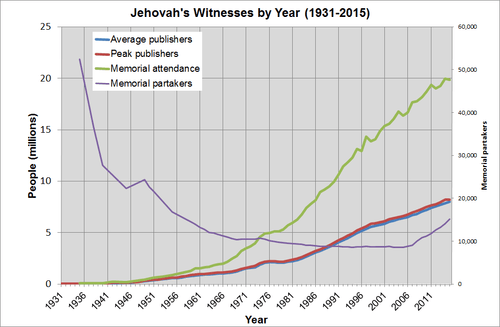Demographics of Jehovah's Witnesses

| Part of a series on |
| Jehovah's Witnesses |
|---|
 |
| Overview |
| Organizational structure |
| History |
| Demographics |
| Literature |
| Teaching programs |
|
|
| People |
| Watch Tower presidents |
|
|
| Formative influences |
|
|
| Notable former members |
|
|
| Opposition |
|
|
As of 2017, Jehovah's Witnesses reported a monthly average membership of approximately 8.23 million actively involved in preaching, with a peak of 8.45 million.[1] Jehovah's Witnesses have an active presence in most countries, though they do not form a large part of the population of any country.
To be counted, an individual must be a publisher, and report some amount of time preaching to non-members, normally at least an hour per month. Under certain circumstances, such as chronic and debilitating illness, members may report increments of 15 minutes. Jehovah's Witnesses' preaching activity is self-reported, and members are directed to submit a 'Field Service Report' each month. Baptized members who fail to submit a report every month are termed 'irregular'. Those who do not submit a report for six continuous months are termed 'inactive'.[2] For 2017, these reports indicated a total of more than 2 billion hours of preaching, and an increase of 284,212 baptized members. Over 10 million were also reported as studying the Bible in their homes with Jehovah's Witnesses,[1] including Bible studies conducted by Witness parents with their children.[3][4]
Jehovah's Witnesses' official statistics only count as members those who submit reports for preaching activity, usually resulting in lower membership numbers than those found by external surveys. For example, Jehovah's Witnesses report approximately 1.2 million active publishers in the United States (including some children), whereas the Pew Research Center reported that Jehovah's Witnesses make up 0.8% of the US population (approximately 2.5 million).[5] Their official statistics indicate membership according to various territories—which they refer to as "lands"—many of which are not independent countries.
The number of people who attend Jehovah's Witnesses' annual commemoration of the Memorial of Christ's death (also termed the Lord's Evening Meal) includes active Witnesses, their children, and others who are invited to attend. According to official statistics, worldwide attendance at the 2017 celebration of the Memorial was 20,175,477.[1] Of those attending worldwide, more than 18,500 people partook of the memorial emblems of unleavened bread and wine.[1] Those who partake profess to be of the 144,000 "anointed" and hope to go to heaven, based on their interpretation of Revelation 14:1.
Congregations are generally organized geographically, and members are requested to attend the Kingdom Hall to which their neighborhood has been assigned, resulting in an ethnic mix generally representative of local population, though congregations based on language and ethnicity have also been formed.[6][7][8] In the United States, 37% of adults who self-identify as Jehovah's Witnesses are African Americans. This is the highest proportion among the 22 largest religious identifications in the United States.[9]
| 'Lands' | Peak Publishers | Congregations | Average Bible Studies | Memorial Attendance |
|---|---|---|---|---|
| 240 | 8,457,107 | 120,053 | 10,071,524 | 20,175,477 |
See also
References
- 1 2 3 4 5 "2017 Grand Totals". Watchtower Bible and Tract Society. 2018.
- ↑ "Keep the Word of Jehovah Moving Speedily". Our Kingdom Ministry: 1. October 1982.
- ↑ "Question Box–Should a family Bible study be reported to the congregation?". Our Kingdom Ministry. Watch Tower Society: 3. November 2003.
- ↑ "Question Box—May both parents report the time used for the regular family study?". Our Kingdom Ministry: 3. September 2008.
- ↑ "Religious Landscape Study". PewResearchCenter.
- ↑ "My Love for the Earth Will Be Satisfied Forever". Awake!: 15. August 22, 1998.
Additionally, congregations of Aboriginal people have been formed in Adelaide, Cairns, Ipswich, Perth, and Townsville.
- ↑ "My Love for the Earth Will Be Satisfied Forever", Awake!, August 22, 1998, ©Watch Tower, page 12-15
- ↑ "I Have Found Many Good Things". The Watchtower: 32. April 15, 2011.
Today, Ibarra has six Spanish-speaking congregations, one Quichua-speaking congregation, and one sign-language congregation
- ↑ "American Religious Identification Survey 2001" (PDF). Graduate Center of the City University of New York. p. 36. Retrieved 2016-05-13.